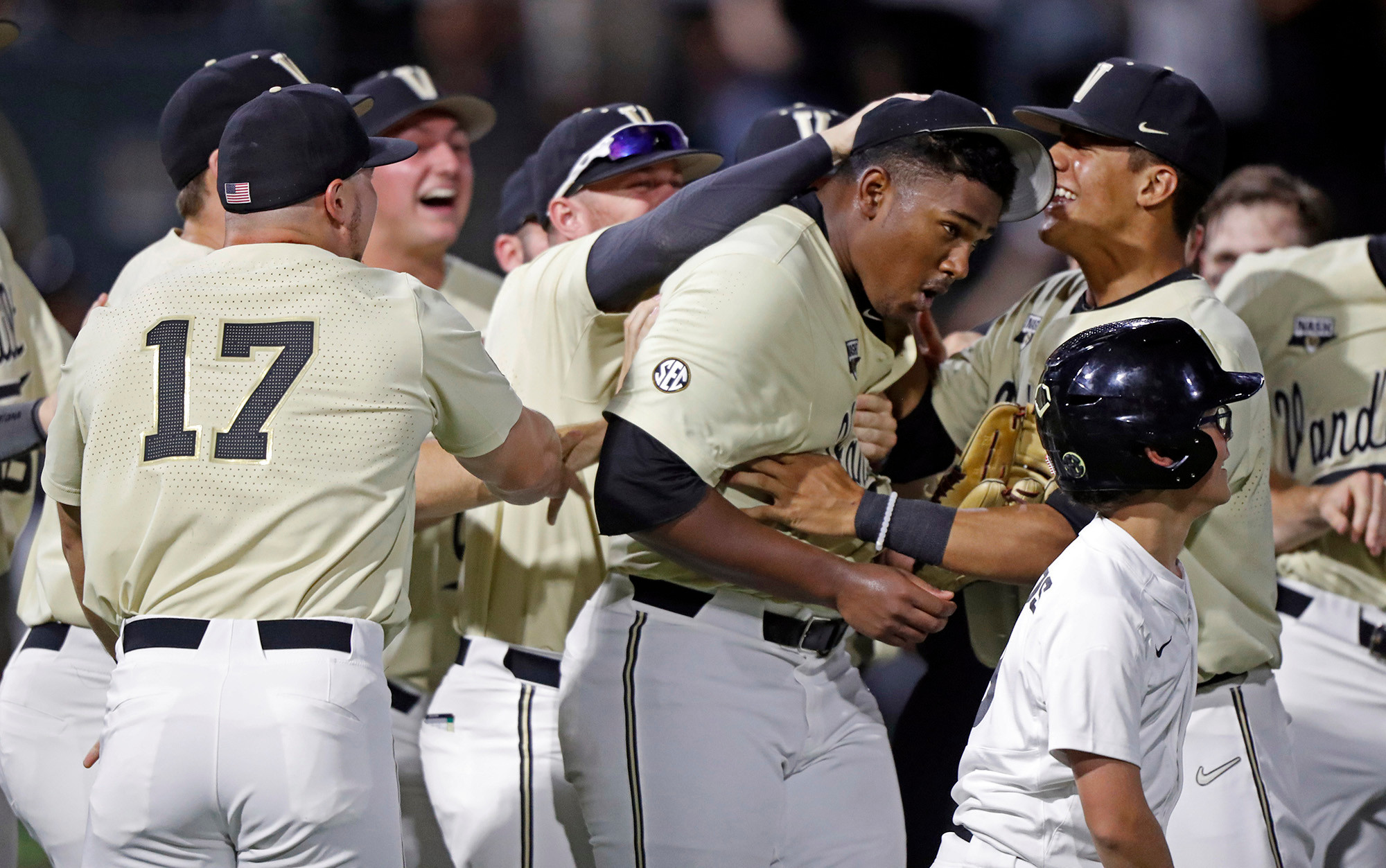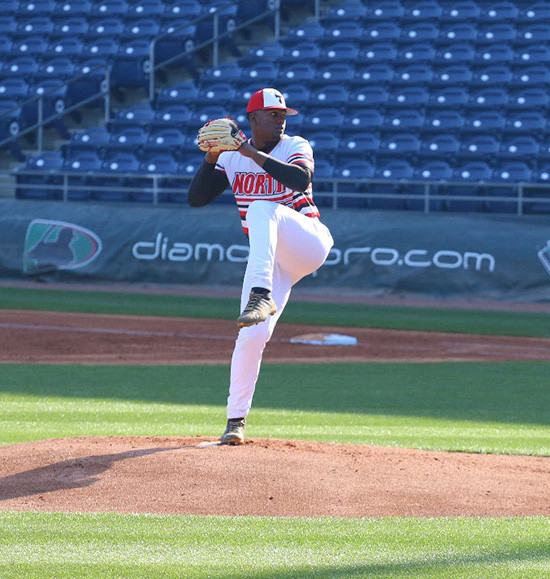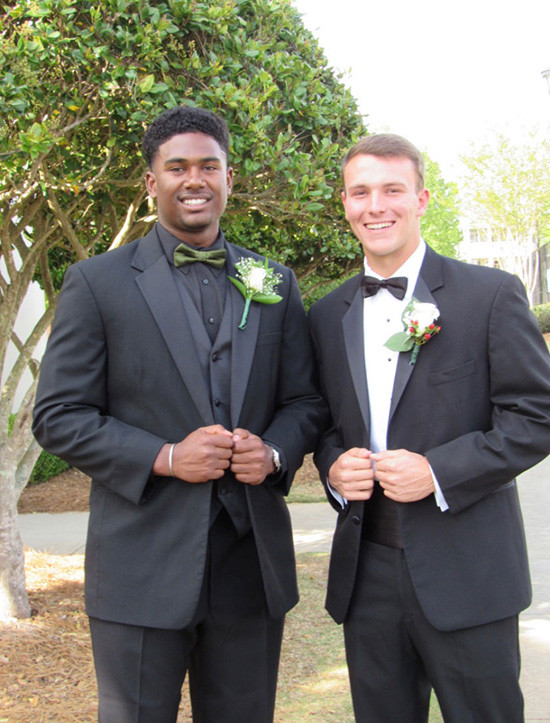More On: kumar rocker
How Mets drafting Kumar Rocker went so very wrong
Mets’ agreement with Kumar Rocker suddenly in jeopardy
Mets draft pick Kumar Rocker built for spotlight: ‘He’s a real one’
MLB Draft would be so much better with trades: Sherman
Mets, Kumar Rocker have understanding in place for contract
For years, the spotlight has followed Kumar Rocker. It was there as the son of a superstar college football player-turned-coach. It was there as he developed into a top-ranked baseball prospect by...
For years, the spotlight has followed Kumar Rocker.
It was there as the son of a superstar college football player-turned-coach. It was there as he developed into a top-ranked baseball prospect by the fall of his sophomore year of high school. It only grew more intense once he led Vanderbilt to the 2019 national championship as the Most Outstanding Player of the College World Series.
But Rocker handled his celebrity with humility. He didn’t let it go to his head. He has embraced his popularity without letting the pressure get to him.
“He’s been in the spotlight for so long that it’s normal,” Rocker’s close friend and high school teammate, Josh Farmer, said. “It’s something he’s become accustomed to. It’s something he’s been built for.”
Rocker has a father, Eagles defensive line coach Tracy Rocker, who has experienced all of this himself as a superstar athlete; a loving mother, Lu, who has always been there for her son; and a close-knit and tight support system he can, and has had to, lean on.
Rocker and Farmer have frequently talked about the coaching cliché “controlling the controllables.” Not letting the outside get in. Not listening to the critics. Not allowing praise to go to your head.

So it wasn’t a surprise to Farmer when Rocker — a chiseled righthanded pitcher at 6-foot-5, 245 pounds — was thrilled when he was picked No. 10-overall by the Mets in this year’s MLB draft. Instead of focusing on his selection being lower than had been projected, Rocker’s mind was on the franchise that was overjoyed to have him, instead of on proving the teams that passed on him wrong.
“From now on, it’s what you do after this [that matters],” Rocker said the night of the draft.
Rocker, 21, arrived at North Oconee High School in Hobart, Ga., as an athletic marvel, bigger and stronger than everyone else. He played both baseball and football his first two years there. It was obvious, though, his future was on the diamond.
Principal Philip Brown joked that Rocker was the “best pile-jumper I’ve ever seen,” always managing to protect his throwing shoulder. He was a starter on the defensive line and had the body for the sport. He once squatted 490 pounds, and had to be stopped before he added on more weight.
But by the start of his sophomore year, he was ranked among the top baseball prospects in the country. Part of Brown selling Jay Lasley on taking the job as North Oconee’s baseball coach was showing him a video of Rocker blowing away hitters as a freshman.

Rocker’s father, a two-time All-American and three-time All-SEC selection as a defensive tackle at Auburn, knew football could ruin his baseball dreams, so he pushed baseball.
“Can you pitch if you have one finger going sideways?” he asked his son once.
Out of high school, Rocker was offered late first-round money, including a signing bonus in the millions, his agent Scott Boras said. But going to college was his family’s preferred choice. Rocker was able to further develop as a player and person at Vanderbilt, and three years later, he is expected to more than double those previous offers with the sort of hefty signing bonus typically given to a top-five pick.
“Their decision was the correct one,” Boras said.
Everyone still marvels at Rocker’s no-hitter against Duke on June 8, 2019. He was a true freshman being tasked with keeping Vanderbilt alive in the NCAA Tournament’s Super Regionals after the Blue Devils had blown out the Commodores, 18-5, a day earlier.
Rocker hit the second batter of the game, Kennie Taylor, with a 97 mph fastball near his left eye. Most pitchers, no matter their age, would be shaken by that. Rocker, though he was concerned for Taylor’s health, was otherwise unfazed. The pressure of the moment wasn’t going to get to him.
“He was Kumar,” catcher Phil Clarke said.
Vanderbilt only mustered three runs, but it didn’t matter. Duke wasn’t going to touch Rocker and that slider. After every inning, Brown and Clarke talked about the previous frame, and Brown remembers the look on his catcher’s face every time he got back into the dugout, an expression that said he had never caught anything quite like this.
“He had 19 strikeouts and all 19 of them were on the slider, so the Mets should be excited about that pitch,” said Clarke, who is now in the Blue Jays’ minor league system at Single-A Vancouver.
Rocker later said the only thing on his mind that day was the team, and ensuring it wouldn’t be its last game. He led the Commodores to their fifth national championship a few weeks later. He pitched twice in the College World Series against Michigan, going 2-0 with a 1.48 ERA and 17 strikeouts in 12 ¹/₃ innings.
“It was one of those things that just cements your place in the history of college baseball as one of the greats, especially when you back it up with a first-team All-American season as a junior,” said D1Baseball.com co-editor Aaron Fitt, who considers Rocker in the same class as Stephen Strasburg as far as household names in college baseball over the past 15 years.
Game recognize game! @CC_Sabathia breaks down @kumarrocker! 💪pic.twitter.com/iT5siPmu5y
— New York Mets (@Mets) July 12, 2021
The slider is Rocker’s calling card, a devastating breaking ball that has some curveball action to it. He will use it in a variety of ways. He will get swings-and-misses with it, he’ll get called strikes, he’ll bury it in the dirt, he’ll throw it at different speeds. It will have different breaks on it. He can add depth or horizontal movement.
“His understanding of how to not consistently throw the exact same pitch, but to manipulate it some depending on the situation, depending on the hitter, is something you don’t see a lot of kids have the ability to do with that pitch,” ESPN and SEC Network college baseball analyst Kyle Peterson said. “That’s what has separated him the whole time.”
The lightning in his right arm isn’t even the most impressive thing about Rocker, those close to him say. More impressive are his selfless and thoughtful personality, his even-keeled demeanor and his advanced communication skills. He has a rare ability to move forward without looking too far ahead. Bad performances don’t stick with him. Stellar outings don’t go to his head. He’s the same guy no matter the outcome. His smile doesn’t go away.
He has a rare ability to move forward without looking too far ahead. Bad performances don’t stick with him. Stellar outings don’t go to his head. He’s the same guy no matter the outcome. His smile doesn’t change.
Take two games in particular as evidence of that. In his first start at Vanderbilt, Rocker was hit around, lasting just 1 ¹/₃ innings against TCU. He was obviously not happy about it. But it didn’t negatively impact him, pitching coach Scott Brown said. Rocker didn’t make excuses. He owned the result and made sure it didn’t happen again.
“Going from that to the MVP of the College World Series is all you need to know about him.” Clarke said.
Then there was the 19-strikeout no-hitter against Duke. The following afternoon, Rocker was hitting fungoes to his teammates, trying to energize everyone before the winner-take-all third game of the series.
It is why Vanderbilt coach Tim Corbin has called him the “ultimate college teammate,” someone who doesn’t let his own performance impact how he treats others. Lasley saw Rocker’s smile that never went away firsthand for three years. He always said Rocker would get paid to show his teeth one day.
“In my eyes, it’s him and Magic Johnson. You don’t find two dudes with better smiles,” Lasley said. “If Madison Avenue has a toothbrush or toothpaste commercial, that’s your guy.”
Prior to Rocker’s senior season in high school, the hype was high. He was ranked among the top prospects in the country, and every start was expected to be an event, littered with scouts. Rocker sat down with Lasley one day to discuss the upcoming season. But he didn’t want to talk about himself. He wanted to make sure the other seniors on the team had a memorable final year themselves.
“I need you to make sure this year is about the seniors,” Rocker told Lasley. “There’s going to be enough attention on me. It’s their senior year. It’s as important to them as it is to me.”
“I was blown away, to be that self aware about other people’s feelings,” Lasley said.

The year before, North Oconee failed to reach the playoffs, which Rocker took extremely hard. After the final game, he broke down in tears as he sat in his car with Farmer. He was so upset he couldn’t do more for his teammates. At that moment, it hit Farmer how much his mega-talented teammate cared. Here he was, with such a bright future, and he was acting like he had played his final game.
“Dang, he’s a real one,” Farmer thought to himself.
He backed it up with actions. Rocker would frequently stop into Lasley’s office to talk about the plans for practice. He would ask if any players needed a kick in the butt, if they weren’t working hard enough. He made sure everyone arrived on time for practice, and he was always the first guy to congratulate a teammate. Before his final season, catcher Will Cain recalled Rocker gathering everyone together to discuss the extra attention they would be getting. It was important to him that the scouts wouldn’t negatively impact the season. Other teams, he told them, might be in awe of the evaluators. But not them.
“We’re not going to let external things such as scouts being there affect us,” he said to his teammates.
On draft night last week, the story was Rocker, why he fell and how fortunate the Mets had gotten. At the start of the spring, Rocker had been expected to be the No. 1 pick. His season, while maybe not quite as dominant as expected, was still strong. He finished tied for the most strikeouts in the country with teammate Jack Leiter. He compiled a 2.73 ERA and led the nation in wins with 14. Though Rocker allowed five runs over 4 ¹/₃ innings in the CWS finals against eventual champion Mississippi State, he was previously 3-0 in elimination games with a 0.84 ERA.
“I think teams overthought it a little bit. It’s easy to nitpick somebody who’s been so famous for so long,” Fitt said. “For me, it’s kind of a no-brainer. You look at the track record and the stuff and the makeup, and it’s like, ‘What are we doing here?’ You’re telling me there are nine guys better than Rocker?”
There was concern about signing demands and fluctuations with his velocity. Fitt believes that his fastball not missing enough bats may have turned off certain teams. The Mets clearly didn’t feel that way. On their post-pick Zoom call, they basically celebrated the pick and were unconcerned about the above issues.
“We’re really all on the same page as to what we felt he was at economically and what the Mets were willing to do,” Boras said.
Rocker didn’t seem to be bothered. Farmer, who was with him on draft night, said it was as if a weight had been lifted off his friend’s shoulders. Rocker said he loved the Mets’ colors and was looking forward to the pressure of pitching in New York City one day. Soon, he may call Queens home.
For years, this has been the expectation, from the time he was a highly ranked sophomore high school prospect. He has treated every step of the way in a similar fashion — not looking too far ahead, not looking behind. He has remained focused on the present, and what a present Kumar Rocker now has.
“His aptitude is equal to the physical ability, and his parents taught him to live a very disciplined life,” Boras said. “Leadership, responsibility, all the character traits you want in a guy who can come in and be a principled part of your franchise is certainly there.”
This story originally appeared on: NyPost - Author:Zach Braziller



















